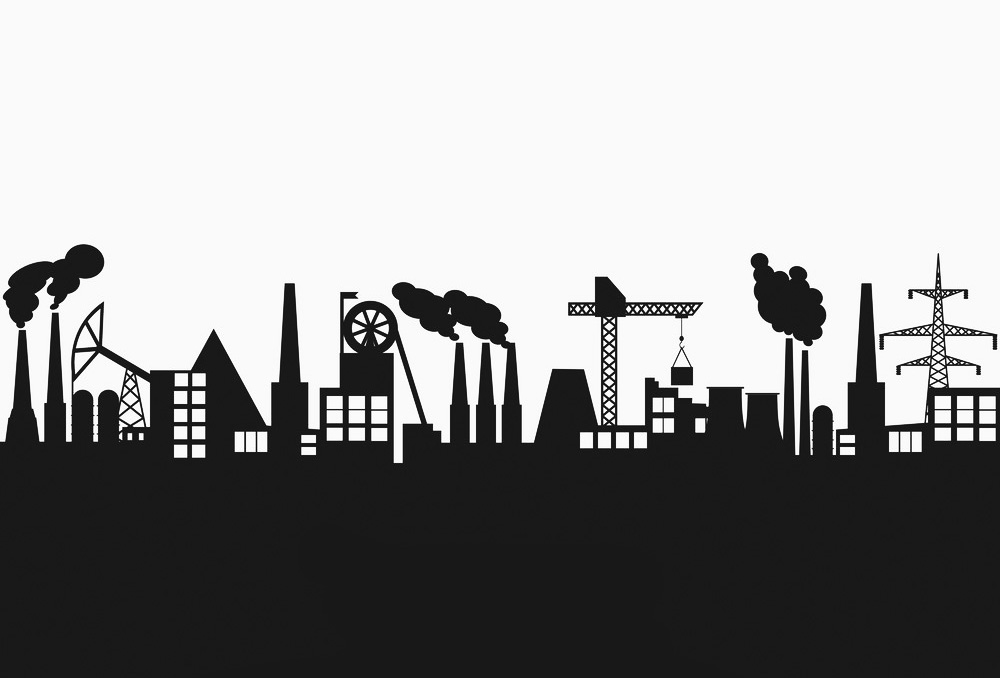A socialist economic alternative includes many essential features such as wage rises and reduced hours for workers, taxes on wealth and profits, expanded and free public services etc. But a core demand is for the nationalisation of economic and natural resources and democratic public ownership of the economy. Here, Eddie McCabe outlines why this is so, and what it means.
The ‘right’ to private property is fundamental to capitalism, and in turn, the abolition of the right private property is fundamental to socialism. To be clear, this doesn’t relate to the things most working people own: the possessions they’ve accumulated because they need or want them, whether that be furniture, vehicles, electronics or jewellery, or even the residential properties that make up people’s homes. Everyone is entitled to such possessions, and in fact only socialism could provide everyone with everything they need or want, to live comfortably — the only constraint being nature’s finite resources and ecological wellbeing.
What the right to private property under capitalism means is the right of a wealthy minority to own and control the world’s key economic and natural resources, including human resources. In other words it’s not just wealth that they own, but the means to produce wealth; which is achieved by the exploitation of everyone who doesn’t own such means — the vast working-class and poor majority. Indeed capitalist property rights essentially amount to legal protection for an exploiting minority against an exploited majority, and the enshrinement of social inequality in the system.
Karl Marx explained this well, writing:
“You are horrified at our intending to do away with private property. But in your existing society, private property is already done away with for nine-tenths of the population; its existence for the few is solely due to its non-existence in the hands of those nine-tenths. You reproach us, therefore, with intending to do away with a form of property, the necessary condition for whose existence is the non-existence of any property for the immense majority of society.”1
A system founded on dispossession
Capitalist private property, then, has little to do with the personal belongings of individuals and everything to do with the power and privileges of the ruling class, which as Marx noted above, is derived ultimately from the disempowerment and misery of the mass of people. Advocates of free market capitalism will preach about the sanctity of private property, insisting that any infringement on private property by governments is a form of despotism. In the words of the influential economist Milton Friedman, “The preservation of liberty… is the primary justification for private property.”2
This principle, however, conveniently ignores the brutal history of capitalism’s origins in the violent dispossession and displacement of people. The first industrial towns in Europe were populated by peasants forced from rural lands that they used to till, whether their own small plots or common lands privatised through ‘enclosure’, into the mills and factories. Likewise colonial conquest throughout the world deprived indigenous peoples of their homelands through plunder, slavery and often genocide. Legal codes were drawn up to legitimise this new state of affairs, with the plunderers now protected by ‘property rights’ backed by capitalist and imperialist states.
The “Anti-theft Movement”
But more than just being a system founded, like all class societies, on unconcealed robbery through violence (expropriation), which is an ever present feature,3 capitalism is a system of concealed but systemic robbery through economics (exploitation). The profits that drive its development, by fueling investments to make more goods and services to make more profits, all come from the work done by workers beyond what they’re paid for — after they’ve covered the cost of their wages, i.e. it’s the work they do for free, creating new value which goes not to themselves but to their bosses. The ratio of paid and unpaid work varies, but no worker is employed (for long) if they don’t create more value than their wages cover.
Take for instance the southern Irish economy in 2019, before the pandemic; the average hourly earning of a worker was €24.23.4 Now, workers in Ireland were said to be the most productive in the world that year, although this measurement was distorted by the inordinate role of multinationals. Still they added an average of €58 to the value of the economy every hour they worked – more than double what they were paid.5 The difference here goes to the state in the form of taxes and overwhelmingly to businesses in the form of profits, meaning they — the business class, foreign and domestic — control the surplus value created in the economy, which also ensures their political supremacy and social and cultural dominance. None of which would be possible if not for the systemic rip-off of workers.
Capitalist property rights protect the money, the land and the luxuries of the ruling elite, but most importantly they protect capital — the means of exploiting wage labour and producing profits.
Understanding all this, James Connolly wrote in 1909: “We would certainly confiscate the property of the capitalist class, but we do not propose to rob anyone. On the contrary, we propose to establish honesty once and forever as the basis of our social relations. This Socialist movement is indeed worthy to be entitled The Great Anti-Theft Movement of the Twentieth Century.”
The necessity of public ownership
The programme of the socialist movement, and any genuine socialist party, must put at its heart the demand for democratic public ownership of the key wealth, resources and industries in society. This naturally involves taking them out of private hands. Only in this way can they be put to use for the benefit of society as a whole, allowing us to begin to actually solve chronic social problems like poverty, homelessness and disease, not to mention the existential threat of climate change.
The climate and biodiversity crisis is particularly illustrative of the necessity of public ownership, although the crises in housing, health or workplace precarity all illustrate the same thing. Is it really conceivable to anyone that the warming of the planet can be reversed or stopped while the major fossil fuel corporations — whose very existence depends on continued emissions of CO2 — are owned and operated as businesses? In fact this entire industry needs to be shut down and replaced by renewable alternatives within 20 years or so. But the cost of this to these corporations is in the region of $25 trillion.6 It hardly needs to be said that they will not give this up willingly. Rather they will do everything in their power to continue to profit from pollution. The only way to stop them, and to save humanity from extinction, is to take the entire industry into public ownership and proceed to phase it out completely.
Anyone who takes the environmental crisis in any way seriously must agree with this much at least. But if we stick with the theme of the environment, the case for public ownership extends to virtually every major industry. Other obvious ones being the automotive industry, which requires a transport system based on privately-owned vehicles; or big agribusiness, which relies on the levelling of rainforests to make space for livestock and animal feed. The radical societal changes needed in both public transport provision and food production – to avert catastrophic climate change – will be vehemently opposed by these two powerful industries. Again, they cannot be left in private hands.
Beyond these, however, a UN report by Trucost found that none of the biggest industries in the world would be profitable if they actually had to pay for the environmental costs of their operations.7 It’s left to the rest of society to foot the bill for the damage through public funds, and by adapting to deteriorating ecosystems.
As long as businesses operate within a market economy, whether they like it or not, profit-making must come before all other considerations, including the welfare of people and the environment. If it didn’t they simply wouldn’t last as competitive businesses. What this means for the climate crisis is that private ownership and control of the key industries in the world is certain to lead to unimaginable disaster. We need an alternative, therefore, to both private ownership and the market system.
Ready for the taking
In many ways the alternative is obvious and simple, and therefore eminently achievable. If the problem is private ownership, the alternative is public ownership. If the problem is production for profit, the alternative is production for need. If the problem is free market anarchy, the alternative is economic planning. But what exactly does all of this entail and how can it be brought about?
Well it makes sense to start at the top. The innate tendency in a capitalist economy is towards monopoly, and the concentration of wealth and economic power in fewer hands. As of 2017, for instance, of the 200 largest economic entities in the world by revenue 157 were corporations and 43 were countries.8 The revenues of the biggest 500 companies in 2021 amounted to over one-third of global GDP, or $32 trillion.9 So we know where to start. Behemoths in retail like Amazon, in manufacturing like Foxconn, in big tech like Microsoft: these and the ilk are the clear priorities for expropriation today, whose resources would be essential to the drafting of an economic plan.
Marx alluded to this dynamic of capitalism, which makes socialist planning possible: “The transformation of scattered private property, arising from individual labour, into capitalist private property is, naturally, a process, incomparably more protracted, violent, and difficult, than the transformation of capitalistic private property, already practically resting on socialised production, into socialised property. In the former case, we had the expropriation of the mass of the people by a few usurpers; in the latter, we have the expropriation of a few usurpers by the mass of the people.”10
Nationalisation
Taking ownership and control of these giant corporations — which dominate industries, which dominate economies — would amount to control over the ‘commanding heights’ of the economy; those sections whose activities support and decisions affect all others. In these cases we’re dealing with multinational corporations, whose operations are often spread throughout the world. They would naturally have to be nationalised by the states from which they originate, but their assets — factories, research facilities, workforces etc. — in any county could be requisitioned by those particular states if deemed necessary or worthwhile. This would likely mean breaking the link with the parent company, and regearing or even retooling them for more socially useful purposes.
For example, nine of the ten biggest pharmaceutical companies have operations in Ireland, mainly US multinationals. Pfizer alone has 3,700 workers on six sites developing and manufacturing medicines, including its Covid vaccine. A socialist government in Ireland could take over these facilities, and work with its highly-skilled workforce to continue to produce quality drugs and vaccines, but with the needs of health systems in Ireland and around the world — not the bank balances of shareholders — as its new touchstone.
The capacity for such publicly-run companies to succeed — independent of their former private owners — clearly depends on the stability offered by the backing of the state, but primarily on the ability of its workers to democratically control and manage the companies themselves. Given that it is the workers who perform all of the key operations anyway there’s no reason to doubt this. One only has to look at the experience of the empresas recuperadas (recovered businesses) in Argentina, where thousands of workers have taken control of hundreds businesses which had gone bust during the financial crisis at the turn of the century.11 Under the slogan “Occupy. Resist. Produce”, these workers transformed bankrupt firms into productive cooperatives, benefiting themselves and their communities, and demonstrating the potential of workers’ control and management. The cooperative model, however, while no doubt an improvement for the workers involved, is severely limited by the fact that cooperatives must still operate by the logic of the profit-driven market, which need not be the case for publicly-owned entities.
Capitalist backlash
The main objection to such nationalisations (which would provoke a wave of moral hysteria from the media, political and business establishment) would no doubt centre around the ‘unconscionable breach of property rights’ protecting these corporations. But as we’ve noted already, property rights under capitalism equate to the right of a parasitic elite to systemically expropriate and exploit the masses. To the cries of ‘theft’, we’ll reply in the spirit of Connolly’s ‘anti-theft’ rebuttal.
More legitimate concerns about such a policy of nationalisation relate to the feasibility of carrying it out in the face of such a backlash from the right. We know from past examples of left-wing governments implementing programmes of nationalisation in the interests of the working class what can happen. In 1981, François Mitterrand of the Parti Socialiste (PS) was elected President of France on a wave of popular support, and a plan to pursue radical reformist policies. This included the nationalisation of the 36 biggest banks, and major manufacturing, steel-producing, arms and computer companies. These were promising measures, but they were met immediately with a flight of capital and attacks on the currency. Without a plan to deal with these economic shock tactics, Mitterrand retreated and shamefully turned to austerity policies.
Worse again was the fate of Salvadore Allende’s Popular Unity coalition in Chile. Allende’s election as President of Chile in 1970 combined with a huge social movement which pushed the government further than its reformist leaders intended to go. Along with the banks and the vital copper mines, private industries such as textiles were nationalised, including the Yarur cotton mill, the largest in Chile, seized by the workers themselves before demanding the government take ownership. In light of all this, Chilean capitalism and US imperialism responded not just with economic assaults but with a murderous military coup in 1973 — bringing the Pinochet dictatorship and neoliberal, ‘free market’ polices to power.
A socialist economic plan
Some would argue that the lesson from these experiences is that socialist or left governments should be careful not to provoke reaction by being too audacious and radical. In fact, the opposite is true, provided a clear and comprehensive socialist strategy exists. The ruling class will oppose every measure by a socialist government that benefits the poor at the expense of the rich. Even significant wealth or corporation taxes, never mind nationalisations, could provoke capital flights and investment strikes, especially if it’s part of a social uprising with revolutionary aspirations.
The lesson from Chile and France is that half-measures are not halfway to victory, but to defeat. Specific nationalisations are necessary in many cases, for example to save jobs when companies fail or abscond. Even right-wing governments do this, but in the form of bailouts to the owners at the expense of the public — for example the effective nationalisation of the banks in Ireland or General Motors in the US during the financial crash of 2008. But a socialist programme demands — and needs — not one-off nationalisations here and there, but the nationalisation of the ‘commanding heights of the economy’ under workers’ control and management, and an overarching plan of production and distribution.
The working out of such a plan is obviously extremely complex, but is fundamentally a technical problem – and not an insurmountable one.12 It requires real participatory democracy at all levels of society and the economy, which requires massive social change in tandem with the transformative economic policies. It could only be brought about by a major social movement driving change from below; mobilising and activating workers, communities and students, to take control of their situations. As part of such a movement, a socialist government could withstand the pressure from international capitalism and indeed the threat from the armed forces of the capitalist state.
By taking back ownership and control of the wealth and resources in society from the capitalist class, and planning their use in the interests of people and the planet, such a movement would be a revolutionary beacon in a world on fire.
Notes
1. Marx & Engels, 1848, The Communist Manifesto, www.marxists.org
2. Milton Friedman, 13 Mar 1978, ‘What Belongs to Whom?’, Newsweek
3. As small farmers in India or indigenous communities in Brazil can attest
4. Eoin Burke-Kennedy, 26 Jun 2020, ‘Average full-time salary in Republic nearly €49,000’, The Irish Times, www.irishtimes.com
5. Eoin Burke-Kennedy, 30 Aug 2021, ‘Irish workers are most productive in world when measured by GDP, The Irish Times, www.irishtimes.com
6. Anamaria Deduleasa, 4 June 2020, ‘Energy transition ‘to wipe $25trn off the value of fossil-fuel reserves’: report’, www.rechargenews.com
7. Films For Action, 22 April 2016, ‘UN Report Finds Almost No Industry Profitable If Environmental Costs Were Included’, www.filmsforaction.org
8. Jake Johnson, 19 Oct 2028, ‘157 of World’s 200 Richest Entities Are Corporations, Not Governments’, www.inequality.org
9. Fortune, February 2022, ‘Global 500’, www.fortune.com
10. Karl Marx, 1867, Capital Volume One, ‘Chapter Thirty-Two: Historical Tendency of Capitalist Accumulation’,
www.marxists.org
11. See the 2004 documentary The Take by Naomi Klein and Avi Lewis for more on this
12. For more see Andrew Glyn, 1979, Capitalist Crisis: Alternative Strategy or Socialist Plan












